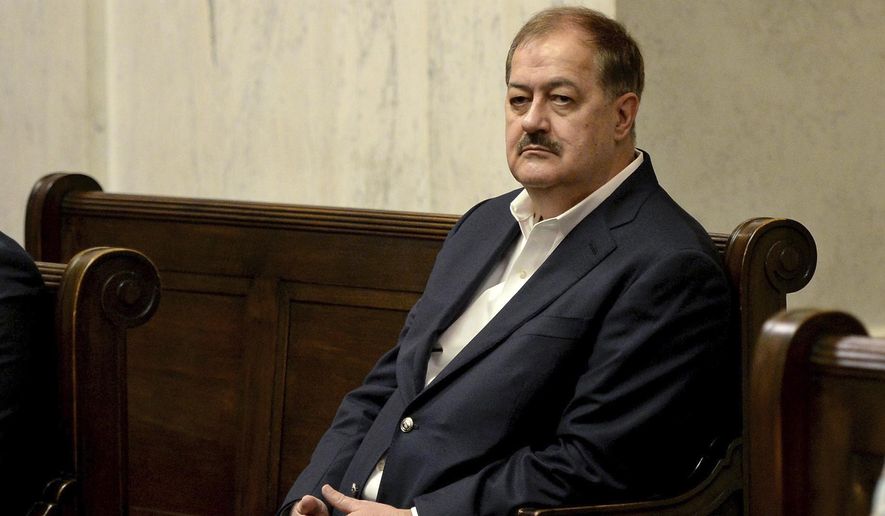Court watchers say there’s little to no chance the Supreme Court will take up a case from convicted criminal and former coal CEO Don Blankenship challenging its precedents that limit news media’s legal liabilities in defamation cases.
Mr. Blankenship is suing more than a dozen media companies, taking his case to the Supreme Court, for referring to him as a “convicted felon” during his 2018 campaign for a U.S. Senate seat in West Virginia.
In legal filings, Mr. Blankenship claims his campaign for the Republican nomination was surging until news reports emerged that he was a “convicted felon.”
He says those reports are inaccurate because he was never convicted of a felony.
“The damage was irreparable. No person convicted of a felony has ever been elected to the United States Senate,” his court filing read.
Mr. Blankenship, instead, was convicted of a misdemeanor related to safety protections for a coal mine he oversaw as the CEO of Massey Energy Company.
He spent a year in jail after a court said he willfully violated health and safety protections for the Upper Big Branch Mine, which exploded in 2010 killing 29 coal miners.
He says Supreme Court precedent, the 1964 case of New York Times Co. v. Sullivan, gives the media the license to defame and damage reputations, which can affect public discourse and elections.
In its 1964 ruling in New York Times Co. v. Sullivan, the Supreme Court held that the press can only be liable for defamation if a plaintiff can show the publication recklessly printed damaging information without regard to its truth or falsity.
“New York Times Co. v. Sullivan, 376 U.S. 254 (1964) and its progeny grant the press a license to publish defamatory falsehoods that misinform voters, manipulate elections, intensify polarization, and incite unrest. Election disinformation undermines our nation’s capacity for genuine self-government,” he states in his petition, filed last week with the high court.
But court watchers say there’s little chance Mr. Blankenship will get a chance to argue his case before the justices.
It would take four of them to vote in favor of reviewing the matter. But only two have expressed an interest in revisiting standards set out in New York Times Co. v. Sullivan.
In 2021, Justices Clarence Thomas and Neil M. Gorsuch said the standard for defamation with public officials set out in the 1964 precedent should be reconsidered as increasingly false reports have emerged and garnered attention.
But “Gorsuch and Thomas are the only Justices who want to revisit this issue. I think the others will stay far away,” said Josh Blackman, a professor at South Texas College of Law.
In the case in question, the high court refused to hear a dispute over a Florida defamation lawsuit in which one man sued another for how he was portrayed in the movie “War Dogs,” with the two conservative justices disagreeing with that rejection.
Justice Thomas questioned the “actual malice” standard in New York Times v. Sullivan, in which the court ruled in 1964 that public figures had to prove that false statements about them were made with intent.
Under that precedent, public officials and figures have a higher burden to prove defamation, including showing that the defamer was fueled by “actual malice,” forcing public figures to prove a statement was made with the knowledge it wasn’t true or with a total disregard to its accuracy.
The standard has made it almost impossible for U.S. public figures to win libel cases.
Justice Thomas appears to favor a common law approach to claims that wouldn’t hold public figures to a higher standard of proof.
“Public figure or private, lies impose real harm,” he wrote.
Likewise, Justice Gorsuch said technology has changed the way media operates, so it may be time for the high court to revisit the law.
“Today virtually anyone in this country can publish virtually anything for immediate consumption virtually anywhere in the world,” he wrote. “The bottom line? It seems that publishing without investigation, fact-checking, or editing has become the optimal legal strategy.”
Curt Levey, president of the Committee of Justice, noted the high court also declined this week to take up a case challenging its Sullivan precedent involving a former member of Congress against political operatives he said defamed him in advertisements.
Mr. Levey said, though, there could be more justices on board in the future to revisit defamation law.
“It doesn’t look like there’s even four votes to take such a case. But that may change soon, given the growing public focus on misinformation in the media and the increasing number of defamation suits brought against media companies, some of which have successfully resulted in settlements recently,” he said.
“At very least,” Mr. Levey suggested, “the Court might be willing, in the near future, to clarify that the Sullivan standard is not what Justice Gorsuch called ‘effective immunity from liability.’”
Lawyers representing the media companies sued by Mr. Blankenship have not filed their response to his petition with the Supreme Court. Lower courts have sided with them, dismissing his defamation claims.
A spokesperson from NBCUniversal, the named defendant in the suit, did not immediately respond to a request for comment.
The case is Don Blankenship v. NBCUniversal, et al.
• Alex Swoyer can be reached at aswoyer@washingtontimes.com.




Please read our comment policy before commenting.